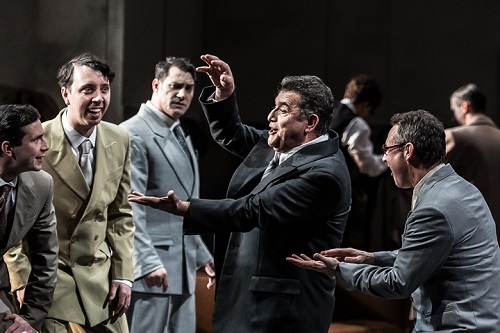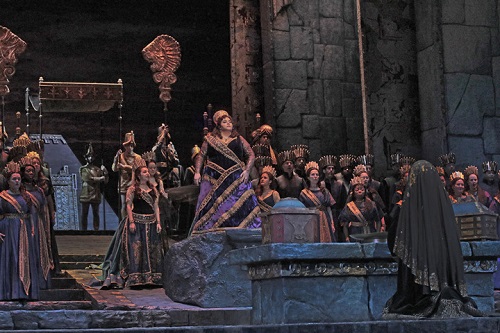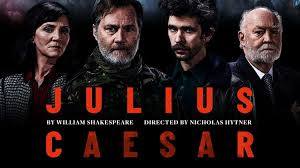
A lot of the performing arts performances (theatre, opera and ballet) that I see these days is experienced at one stage removed in a cinema. The performers are giving their utmost but I am not in the venue with them.
So it was this month with the New York Met's performance of Rossini's Semiramide, the RSC's performance of Julius Caesar and the filmed adaptation Michael Bond's Paddington books.
The odd one out was an evening spent with Opera North at the Lowry in Salford.

 Un ballo in maschera is not the best of Verdi from this middle period despite its containing his most passionate love duet ever: most of the best music is in the first half. It's a hybrid, transitional work. There's elements of commedia in Oscar (Verdi's only ever trouser role), of historical drama in the story of Gustav III of Sweden, of family loyalties pulled apart by forbidden love (as in Rigoletto and La traviata and even a bit of the unearthly in the soothsayer Ulrica (shades of Azucena in Il trovatore).
Un ballo in maschera is not the best of Verdi from this middle period despite its containing his most passionate love duet ever: most of the best music is in the first half. It's a hybrid, transitional work. There's elements of commedia in Oscar (Verdi's only ever trouser role), of historical drama in the story of Gustav III of Sweden, of family loyalties pulled apart by forbidden love (as in Rigoletto and La traviata and even a bit of the unearthly in the soothsayer Ulrica (shades of Azucena in Il trovatore).
Tim Albery is a very sane and sensible director. However, his decision to set the show in 1930s Sweden, whilst it gave us some lovely frocks, stripped the piece of its unhinged passion. Everything was just too reasonable, sober, studied and neat.
Despite excellent conducting from Richard Farnes and more than acceptable singing from the cast, I couldn't stomach it. I felt dog tired and so I used this as my excuse for leaving at the interval.
 The latest cinecast from the Met at FACT was Rossini's Semiramide. It's not often done. I last saw it back in 2005 at the Liceu in Barcelona. Before that was a concert performance in 1986 at Covent Garden. None of the three performances that I have witnessed has persuaded me that the work is the towering masterpiece I am told that it is. The concert performance felt leaden to my untutored ears of thirty-odd years' ago. The Liceu performance was too full of presentational ideas for it to make any sense to me.
The latest cinecast from the Met at FACT was Rossini's Semiramide. It's not often done. I last saw it back in 2005 at the Liceu in Barcelona. Before that was a concert performance in 1986 at Covent Garden. None of the three performances that I have witnessed has persuaded me that the work is the towering masterpiece I am told that it is. The concert performance felt leaden to my untutored ears of thirty-odd years' ago. The Liceu performance was too full of presentational ideas for it to make any sense to me.
If the Liceu production was, in my words, "a cross between a session of the United Nations and the War Room from Dr Strangelove", John Copley's Met production was solidly Cecil B de Mille Babylon and utterly pedestrian. In principle, I have no objection to any of the three styles of presentation which I have witnessed but, so far, no-one has actually told me the story.
Angela Meade was in sovereign voice for Semiramide. I liked Javier Camarena's Idreno and I got to hear Ildar Abdrazakov sing Assur once more. Maurizio Benini conducted a solid performance (in more ways that one).
It will take a lot to persuade me to try this particular work once more.
 After last year's RSC Up Pompeii version of Julius Caesar (usually a very gripping play), I looked forward to a presentation with a bit more bite in this cinecast from the Bridge Theatre. Julius Caesar is, after all, a play warning of the dangers of violent regime change - a hot topic in the late 16th Century.
After last year's RSC Up Pompeii version of Julius Caesar (usually a very gripping play), I looked forward to a presentation with a bit more bite in this cinecast from the Bridge Theatre. Julius Caesar is, after all, a play warning of the dangers of violent regime change - a hot topic in the late 16th Century.
Fresh from the Civil War of the Roses and the seismic schism from Rome, the first audiences knew directly from common tales and family histories the sorts of horrors that regime changes could wreak upon the land.
So, I think that, for the play to really work, the audience has to be acutely that they experience and witness three regime changes during the two hours' traffic of the stage.
During the first scene, the ensemble are busy tearing down the public images of Pompey's old regime before Caesar's arrival in Rome. Marullus and Flavius (did but they know it) are placing themselves in grave danger by praising Pompey and removing any of Caesar's trophies from the streets. Theirs would be the first deaths in any production that I presented.
There's got to be some sense of gear change and some reason for Caesar's death. And then all hell breaks loose with a nation split asunder until Octavius (Augustus) Caesar can restore good order. Of course, the contemporary Elizabethan audience got it. It must have been the hot ticket of the season for all of the young firebrands in town.
And the show was sensationally good. Nigel went to see it at The Bridge and felt that it was a very immersive experience for sure. Immersive!? Jeez, it must have felt as though you were standing amongst the heavy ordinance at Waterloo at some points. He didn't catch the screening and that may be a blessing because I can't imagine that a cinecast can have done justice to that experience.

Nicholas Hytner's direction was impeccable and his cast rose to every challenge - Julius Caesar: David Calder, Brutus: Ben Whishaw, Cassius: Michelle Fairley, Mark Anthony: David Morrissey and Octavian: Kit Young. I'm so glad I went to see it.
 And similar feelings for Paddington produced as a cinematic experience and seen in the cinema.
And similar feelings for Paddington produced as a cinematic experience and seen in the cinema.
I had laughed out loud at the trailer many months back and I laughed even more in the cinema.
The whole production was pitch perfect in that very English balance between good manners and mayhem.
In the words of Frankie Howard, it was very tittersome.